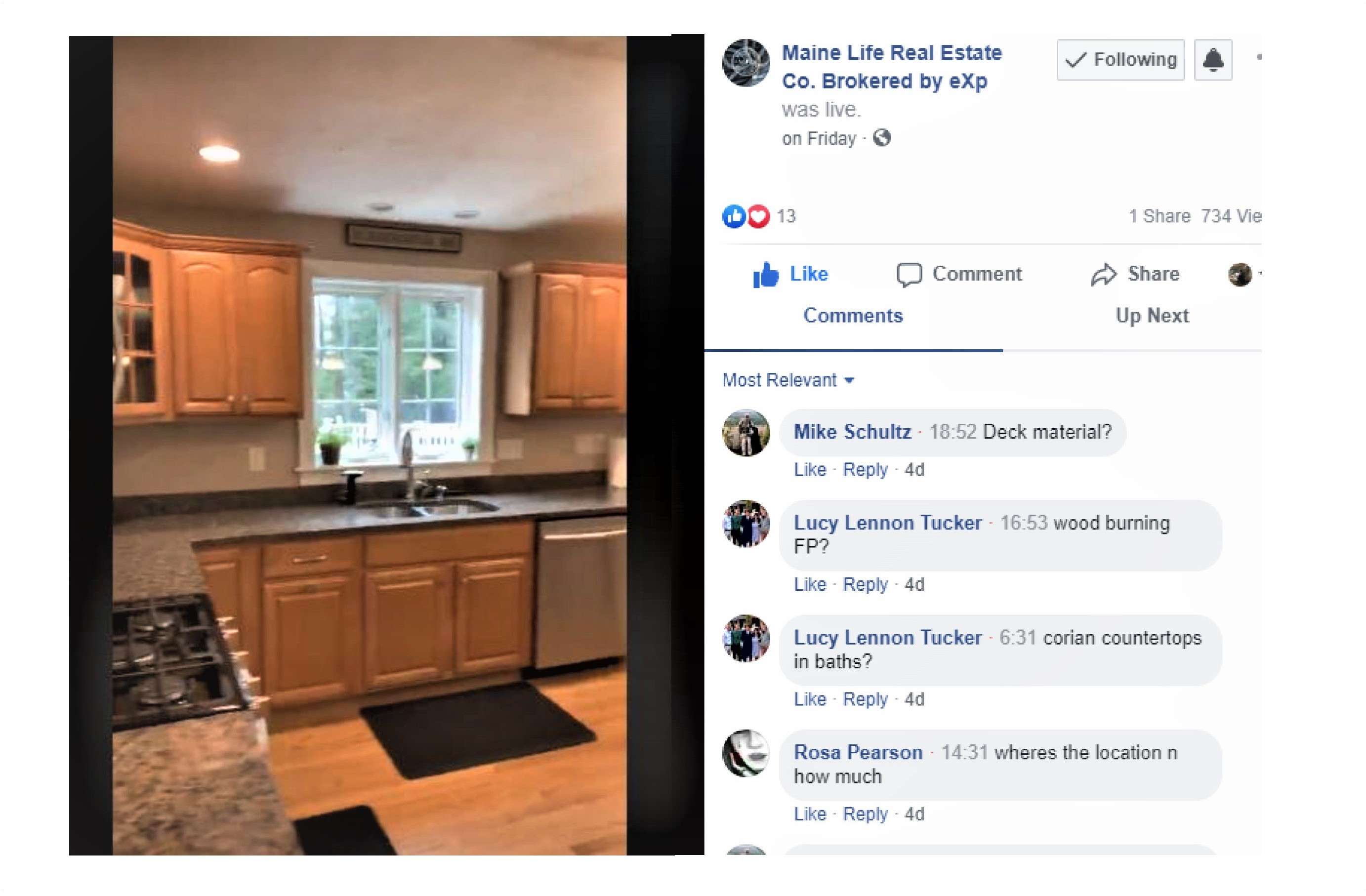
Processing Your Payment
Please do not leave this page until complete. This can take a few moments.
Maine brokers make the best of the virtual real estate world
 Photo / Nadra Edgerley
Real estate broker Rob Edgerley, of Maine Life Real Estate, of Scarborough, conducts a virutal open house March 20.
Photo / Nadra Edgerley
Real estate broker Rob Edgerley, of Maine Life Real Estate, of Scarborough, conducts a virutal open house March 20.
As Maine Life Real Estate broker Rob Edgerley showed off the Scarborough listing, another broker on the house tour had a question.
"Are the bathroom countertops Corian?"
Others weighed in, asking about room dimensions, the generator, whether there had been an above-ground pool — the kind of questions brokers raise on any tour as they look over a listing.
In that way, the March 20 tour was similar to tours that have been going on since brokers began showing property.
But Edgerley was showing the house on Facebook Live. Questions and comments started coming in after he and his wife, Nadra, arrived with hand sanitizer and gloves, as well as a roll of toilet paper to leave as a housewarming gift.
Welcome to the virtual real estate world of the COVID-19 pandemic.
Maine Life, of Scarborough, is just one of many residential and commercial real estate brokerages across Maine that are finding ways to bring potential buyers to the properties in a world of physical distancing and business closings.
At NAI The Dunham Group, in Portland, brokers had their first virtual weekly meeting Monday, and it went well, said Justin Lamontagne, partner and broker.
"Our brokers are connecting regularly through cell, email," he said. "It was really nice to discuss activity and deal-flow. But, more so, it was great to see one another. I’m learning that’s as important as anything during this time."
Brokers told to be aware
As the COVID-19 pandemic upends lives and business around the world, the National Association of Realtors has a page dedicated to open houses, as well as an overall guide for Realtors.
The association advises members to look at federal, state and local authorities' recommendations and actions, including stay-at-home orders and other measures and what impact they have on whether open houses should, or are permitted to be, held.
Even where open houses are permissible, "NAR strongly encourages members to consider the advisability of continuing to hold open houses at this time, especially in light of the guidance and actions of federal, state and local authorities." Federal (and in Maine, state) guidelines recommend gatherings of 10 or more persons be avoided.
In Maine, virtual and video tours have been used for years, but there's definitely been an uptick, Tom Cole, president of the Maine Association of Realtors, told Mainebiz Monday.
“I’ll walk through a house with my iPhone and show them different parts of the home,” he said. “They ask questions and I can answer their questions. We’re doing that more and more, even for people who are close by who normally would be with a realtor at the house.”
Cole, who's managing broker for Better Homes and Gardens Real Estate The Masiello Group in Brunswick, said in-person viewings are still available, but are scheduled so that appointments don’t overlap. He and his agents keep nitrile gloves and disinfectant wipes on-hand. “We’re being very cautious as we look at homes, particularly when people are living in the homes,” he said.

Personal contact is key
But both Edgerley and Lamontagne said nothing beats the personal contact that is key to selling real estate.
"Business can be done remotely," Lamontagne said. "But it’s most effective, and enjoyable, in person."
There were 25 viewers of watching Edgerley's tour live on Facebook while he was doing it. Since then, more than 750 have viewed the video tour of 20 Woodspell Road in Scarborough.
He said the virtual open house went well, but it wasn't the same as an in-person one. Maine Home scheduled tours, for no more than four people at a time, by appointment the following Sunday. They made sure there was hand sanitizer, wipes, and gloves available and that everyone practiced physical distancing.
"While not the most ideal way to do an 'open house,' I think it's a great way to deal with a less than great situation," Edgerley said. "People were engaged and interactive, asking good questions and giving positive comments, including some of my fellow agents who were previewing the home for their clients."
He said that the drawback is "you lose some of the excitement of having many people through at the same time, which can create more demand."
Preparing for slow one or two months
And those drawbacks will likely drive down a market that's been nothing but hot for the past couple years.
February single-family home sales were up 5.75% over February 2019, the state association said. The median sales price for the 865 homes sold increased 8.45% from a year ago, from $200,000 to $216,900. In a month that's traditionally slow, it was the second-highest number of February sales since the state association began keeping statistics 20 years ago, Cole said.
Industrial and commercial sectors were doing well, too.
"I was very confident in the overall market/economic conditions prior to this outbreak," Lamontagne said. "And I saw no material reason for change or concern until this virus reared its ugly head. We are already experiencing extension requests and 'tapping the brakes' on our deals. I don’t expect that to change.
"We are preparing for a very slow one to two months, but communicating consistently with our clients. I don’t suspect we’ll make much money in the short term but, frankly, our jobs will never be more important than during these challenging times."
Edgerley said, too, that further restrictions could change things. While real estate is considered an essential industry, and so doesn't come under Gov. Janet Mills' mandate that nonessential businesses close their public-facing operations, changes will still have an effect.
"As we enter into the shelter in place orders, it will be interesting to see what happens to the market," he said.
Future is still bright
But they also said that the market is positioned to bounce back once the crisis is over.
"For years we have had high demand, and I feel that we will still have strong demand once we reach the other side of this current crisis," Edgerley said. "Maine is still a strong economy. We're all in this together."
Lamontagne said, considering the market was strong before the outbreak, "It stands to reason, we will be well positioned to bounce back quickly once the virus is controlled."
He said while there may be help available for businesses, there are bigger concerns.
"I hope the fed's involvement focuses largely on those with short-term needs and pain-points," he said. "I’m far more concerned about the single mom waitress than I am about the state of the commercial real estate market. If Gov. Mills or the feds ultimately enforce further restrictions, I’ll fully support it in the interest of getting back to normal as soon as possible."
Both also believe it'll be a different business in some ways, once the crisis is over.
"I'm interested in two fascinating trends that will emerge from this as it relates to commercial real estate and business in general," Lamontagne said. "Most obviously, it will force companies to embrace remote technology and, basically, get better at it. I expect much 'smarter' offices moving forward and, as a result, more technologically comfortable employees (not just Millennials).
"Secondly, I think we will miss interpersonal connectivity," he said. "There has to be a balance and I have no doubt that once things subside, networking and in-person business development will thrive once again."
Edgerley said that he's reminded "some of the greatest achievements, inventions and leaders have come out of crises."
"Let’s get innovative and keep moving forward," he said.










0 Comments